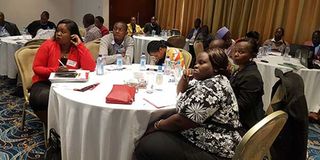Hivos EA to launch sustainable diets project in Nakuru County

Stakeholders during a workshop ahead of the launch of the Sustainable Diet for All project in Nakuru County by Hivos East Africa. PHOTO | RACHEL KIBUI | NATION MEDIA GROUP
What you need to know:
- The project will also aim at ensuring that the target population is nutritionally safe.
- Dr Njuthe said there is a gap between food preference and food security.
- She added that research has revealed a direct link between nutrients-deprived soils and malnutrition.
Good nutrition is vital for all people especially vulnerable groups including children, the aged and the sick.
However, over time, people have been emphasising more on the need to eat a well-balanced diet, leaving aside important dietary aspects like minerals and trace elements. These include traces like zinc, magnesium, calcium and potassium among others.
In a bid to promote better nutrition for all, Hivos East Africa will soon be implementing a project in Nakuru County that will also aim at enhancing sustainable diet for all.
A non-governmental organisation, Hivos will be running the project under the name Sustainable Diets for All (SD4ALL) with an aim of influencing policy and practices of markets, government actors and international institutions. This will be done through citizen action for the promotion of sustainable diets for all.
NUTRITIONALLY SAFE
The project will also aim at ensuring that the target population is nutritionally safe and that there is enough of nutrition-rich food, that the nutritional food will be affordable and accessible to the low income consumers and that there will be a productivity and respect for biodiversity and ecosystems.
The programme will support civil society organisations to improve their capacity to influence policy and practices of market and government actors through citizen’s agency, citizen research, action and related advocacy to promote sustainable diets.
Speaking during a SD4ALL stakeholders workshop in Nakuru, county executive for Agriculture Immaculate Njuthe said there is need to look at food from not only an aspect of food security, but also nutritional security.
GAP
Dr Njuthe said there is a gap between food preference and food security.
Most people, she added, depend on certain types of food because of culture and availability, while they fail to consider the nutritional value of what they consume.
She urged stakeholders to work with research organisations and academic institutions to address food insecurity and malnutrition.
“We have to focus beyond carbohydrates, vitamins and proteins, and instead include vitamins, minerals and micro-nutrients,” said Dr Njuthe.
Notably, she added, research has revealed a direct link between nutrients-deprived soils and malnutrition.
“It has been noted there is a direct link between lack of zinc in soils for example, and lack of the same in food,” noted Dr Njuthe.
She asked Hivos and other stakeholders to emphasise on gender dynamics in nutritional issues and ensure inclusivity in regard to enhancing knowledge and implementation of the project.

Nakuru County Executive for Agriculture Immaculate Njuthe. She says there is need to look at food from not only an aspect of food security, but also nutritional security. PHOTO | RACHEL KIBUI | NATION MEDIA GROUP
CLIMATE CHANGE
She said climate change, poverty and lack of innovation are some of the top challenges to food and nutritional security.
“Even those who are food and nutritional secure carry the burden of those who do not have,” noted the county minister.
It is anticipated the SD4ALL project will start later in the year and end in 2020.
At the end of the programme, implementers hope to have a well-informed citizenry, engage the media more on sustainable diets and have the government(s) adopt policies that are focused on sustainable diets.
Projects Manager Ann Majani said the youth will be involved in the project in a bid to influence them and also use them to influence others, both younger and older.
The programme will also work with local artist Julius Owino (popularly known as Juliani) in a bid to blend creativity in passing the message of sustainable diets for all.
Speaking at the workshop, Juliani said that lack of good nutrition could only be equalised to lack of human dignity.
He added that the citizenry need to be informed, organised and be active in matters pertaining to sustainable diet and good nutrition.
The decision to have the project specifically picked for implementation of this project, was reached following a research that showed that the county has high rate of malnutrition.





